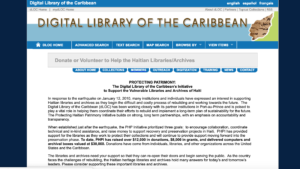

Screenshot of the home page for the Protecting Haitian Patrimony Project at the Digital Library of the Caribbean (http://dloc.com/dloc1/haitianlibhelp)
The Digital Library of the Caribbean’s (dLOC) past projects have included the Protecting Haitian Patrimony Initiative (PHP) (2010) and About Face: Revisiting Jamaica’s First Exhibition in Europe (2012). PHP supports at-risk Haitian libraries and archives in archival recovery and preservation post-earthquake in January 2010. About Face, an online exhibition curated by art historians Petrine Archer and Claudia Hucke presents digitized original content from Face of Jamaica, an art exhibit that toured Europe from 1963-64 and was never brought to Jamaica.
These demonstrate the dLOC’s mission in-practice: to provide researchers “greater access” to digitized Caribbean content materials and advance Caribbean studies through a “cooperative digital project.” Founded in 2002 by nine institutions either in the Caribbean or with prominent Caribbean Studies departments, libraries, and archives, the dLOC now hosts open access to 6,000 titles and 675,000 digitized images from forty-seven partner institutions. Featuring several “topical collections,” materials are organized by format, thematic groups, special collections, and exhibits. The project is powered by SobekCM, a software engine which offers free training and software download.
The dLOC’s outreach efforts include K-12 teacher training and lesson plans, digitization toolkits for all partners and yearly conferences. User-friendly search tools include an interactive map where materials can be found by region and keyword searches. Given these search tools, the project seems primarily intended for researchers both familiar with the Caribbean’s culture, history, and people and some sense of research interests/goals.
All lesson plans, site software, and digitization training at dLOC are freely downloadable to users, perhaps staging dLOC as a model for future collaborative digital projects. dLOC’s cooperative approach and commitment to sustainable digital access and recovery support collections that might otherwise exist in isolation or struggle to obtain funding for digital projects. This isolation is in part due to the Caribbean being understudied in academe, stigmatizations that archipelagoes lack culture/history, and “fragmentation” of Caribbean nations and identities (mirroring that of the internet, as per Kelly Baker Josephs).



